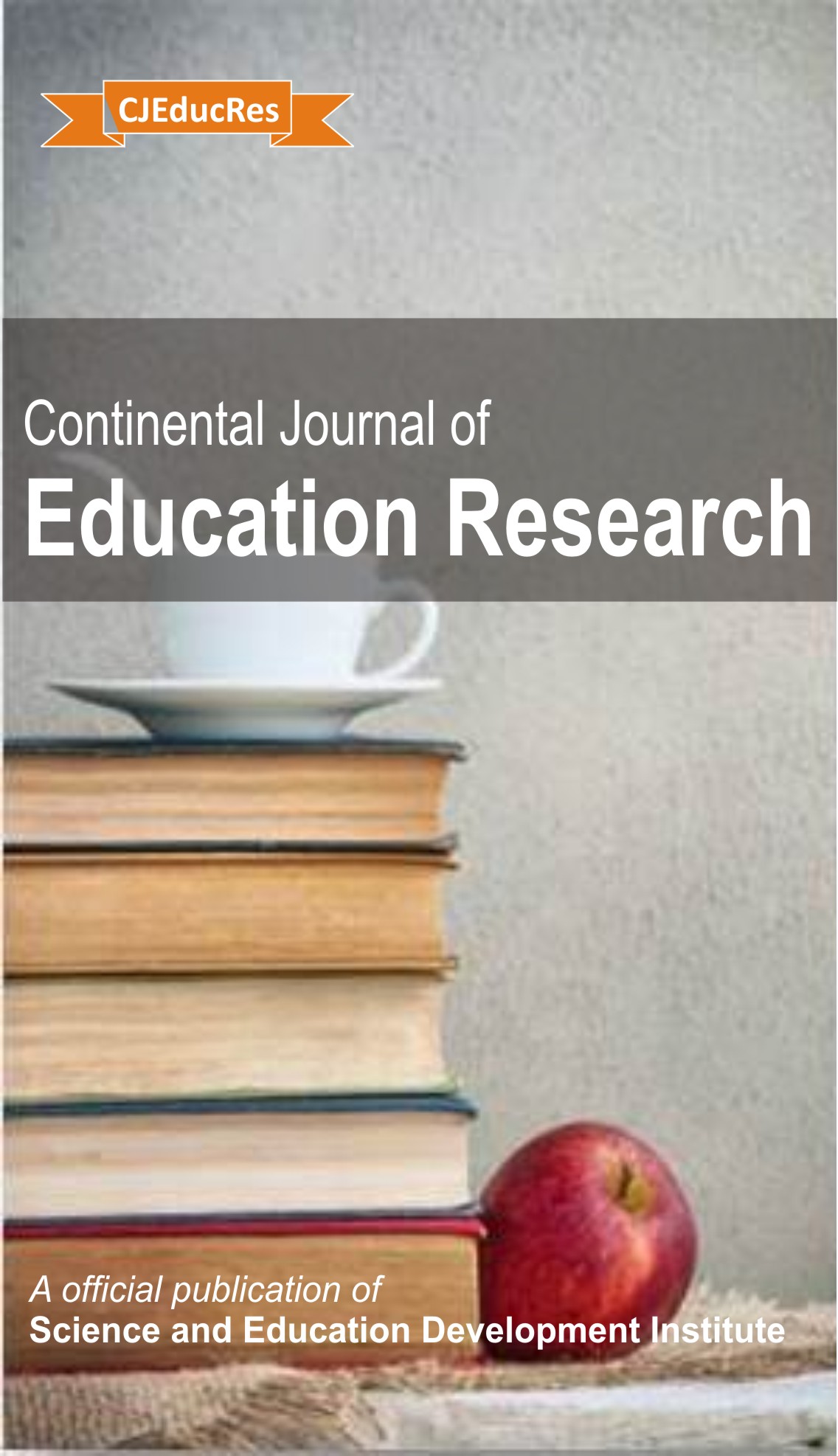
CONTINENTAL JOURNAL OF EDUCATION RESEARCH
Science and Education Development Institute
DOI: 10.5897/UJ-CJEducRes
Email: managingeditor.olawale71@gmail.com
PROFICIENCY LEVEL OF MALE AND FEMALE SECONDARY SCHOOL MATHEMATICS TEACHERS TOWARDS TEACHING
DOI: 10.5897/UJ-CJEducRes.17.003.1 | Article Number: 4FED981 | Vol.9 (1) - June 2016
Authors: Itankan Areachot Wilfred and Bakke Manasseh Matthew
Keywords: proficiency level, male and female mathematics teachers, mathematics achievement test, independent t-test
The study examined proficiency level of male and female mathematics teachers in teaching. A Twenty (20) multiple choice items of Mathematics Achievement Test (MAT) was constructed and validated with 0.87 reliability coefficient. A sample of one hundred and twenty (120) (55 males and 65 females), Secondary School Mathematics teachers were randomly selected from thirty (30) Secondary Schools in Cross Rivers State for the study. One research question and one hypothesis were formulated to facilitate this study. The hypothesis was tested using independent t-test at 0.05 significant levels. The result revealed that, there was significant difference between the proficiency level of male and female mathematics teachers toward teaching. Suggestions and recommendations were made base on the finding.
Abiam P.O. and Akwa, A.M (2004). Implementing the Mathematics Curriculum to ameliorate the effect of Gender-stereotyping on mathematics needs of female students. Paper presented at the 5th Biennial Conference of the World Council for Curriculum and Instruction, Nigeria chapter, University of Calabar, Calabar. 3rd march, 2003.
Antyakaha, E.U. (2003). Gender concept and implications for development. In N.N. Osakwe (ed), the Process of indigenous communication teaching of core subjects and gender mainstreaming, Lagos: Literamed Publications.
Amba, A.N. (2003). The attitude of teachers to work and its consequence on the Academic performance of primary school pupils in Ikom Local Government Area. Unpublished Research Project, College of Education, Akamkpa.
Azuka, B.F.(2009)Acting Learning in the Mathematics Classroom. National Mathematical Centre, Lecture Notes for the Capacity building workshops for Junior and Primary Schools Mathematical Sciences Teachers in Enugu State. Abuja: Mavelous Mike Press.
Binda S.I. (2005). Effect of understanding the language of Mathematics on Performances in Mathematics among secondary school students in Plateau State. Ph.D Thesis, University of Jos.
Combs, P.H. (1968). The world Education Crisis. A system analysis. New York, Oxford University-Press.
Cameron, (1923). Sex achievement in Mathematics. In R.R. Dale(ed): Mixed or Single-Sex School? New York Humanities Press.
Denga, D.I. (1991). Vocational Education. Calabar, Education Publisher Ltd.
Ekwueme, C.O. (2013). Mathematics Teaching and Learning in School. Calabar, Radiant Ventures Nig.Ltd.
Eniayeju, A.A. and Azuka, B.F. (2010). Impediments to Mathematics Teaching at the Universal Basic Education Level in Nigeria. Journal of Mathematical Sciences Education, 1(1) p 54-71.
F.R.N (2004). National Policy on Education Abuja. NERDC.
Lassa, P.N. (1984). The sorry state of Mathematics Education. An inaugural address presented at the Annual Conference of the Mathematics Association of Nigeria, Kaduna.
Leome, J.C. (1974). Education and Tasks Development New York Longman Green and Co.Int.
Odok, J.K. (2001). Enhancing Performances in Mathematics, the Teacher’s factor. Journal of Educational Issues, Vol.3 p171-179.
Offen,E.O.(2005). Gender indifference on Mathematics Achievement unpublished Research Project, College of Education, Akamkpa.
Okebukola, P. (1999). Gender equality in Science classrooms. Paper Presented at a UNESCO Conference, Pretoria and South- Africa.
Piret, R. (1965). Females solve Problems better when in a group of both sexes rather than a group by themselves. New-York. Humanities Press.
Yusuf, F.I. (2009). Strategy for Effective Teaching and Learning of Calculus in Senior Secondary Schools. The Journal of the Mathematical Association of Nigeria (Abacus), 34(1), 19-24.
